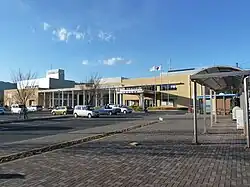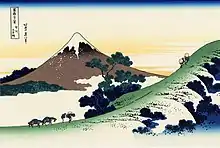Uenohara
上野原市 | |
|---|---|
 Uenohara City Hall | |
 Flag  Seal | |
 Location of Uenohara in Yamanashi Prefecture | |
 Uenohara | |
| Coordinates: 35°37′48.7″N 139°06′40.8″E / 35.630194°N 139.111333°E | |
| Country | Japan |
| Region | Chūbu (Tōkai) |
| Prefecture | Yamanashi |
| Town settled | December 27, 1897 |
| City settled | February 13, 2005 |
| Government | |
| • Mayor | Nobuyuki Murakami (since March 2021) |
| Area | |
| • Total | 170.57 km2 (65.86 sq mi) |
| Population (July 1, 2019) | |
| • Total | 23,158 |
| • Density | 140/km2 (350/sq mi) |
| Time zone | UTC+9 (Japan Standard Time) |
| - Tree | Japanese maple |
| - Flower | Gentiana scabra |
| - Bird | Cettia diphone |
| Phone number | 0554-62-3111 |
| Address | Uenohara 3832, Uenohara City, Yamanashi 409-0192 |
| Website | Official website |
Uenohara (上野原市, Uenohara-shi) is a city located in Yamanashi Prefecture, Japan. As of 1 July 2019, the city had an estimated population of 23,158 in 9987 households,[1] and a population density of 140 persons per km². The total area of the city is 170.57 square kilometres (65.86 sq mi).
Geography
Uenohara is located in the extreme eastern edge of Yamanashi Prefecture, on a fluvial terrace of the Sagami River.
- Mountains: Mount Mikuni, Mount Mitou, Mount Ougi
- Rivers: Sagami River, Tsuru River, Nakama River
Surrounding municipalities
- Yamanashi Prefecture
- Tokyo
- Kanagawa Prefecture
Climate
The city has a climate characterized by characterized by hot and humid summers, and relatively mild winters (Köppen climate classification Cfa). The average annual temperature in Uenohara is 13.4 °C. The average annual rainfall is 1497 mm with September as the wettest month. The temperatures are highest on average in August, at around 25.5 °C, and lowest in January, at around 2.2 °C.[2]
Demographics
Per Japanese census data,[3] the population of Uenohara peaked around the year 2000 and has declined since.
| Year | Pop. | ±% |
|---|---|---|
| 1940 | 24,349 | — |
| 1950 | 30,909 | +26.9% |
| 1960 | 28,992 | −6.2% |
| 1970 | 28,317 | −2.3% |
| 1980 | 27,878 | −1.6% |
| 1990 | 27,790 | −0.3% |
| 2000 | 30,157 | +8.5% |
| 2010 | 27,114 | −10.1% |
| 2020 | 22,669 | −16.4% |
History
The area around present day Uenohara was heavily settled in the Jōmon period, and numerous Jōmon sites have been found within city limits. However, there are fewer Yayoi period sites. During the Nara period ritsuryo organization of Kai Province, the area came under Tsuru County. From the middle of the Kamakura period, much of the province came under the control of the Takeda clan, although as a border area adjacent to the holdings of the Uesugi clan and the Odawara Hōjō clan, it was the location of many skirmishes and battles. During the Edo period, all of Kai Province was tenryō territory under direct control of the Tokugawa shogunate. During this period, the Kōshū Kaidō, one of the Edo Five Routes, passed through Uenohara, which had four of the 45 post stations on that route. The area was also a noted center for sericulture.
After the Meiji restoration, the village of Uenohara was established on December 27, 1897 with the creation of the modern municipalities system. Uenohara became a town on April 1, 1955 ny annexing seven neighboring villages. The modern city of Uenohara was established on February 13, 2005 by the mergers of the former town of Uenohara (from Kitatsuru District), absorbing the village of Akiyama (from Minamitsuru District).
Government
Uenohara has a mayor-council form of government with a directly elected mayor and a unicameral city legislature of 16 members.
Economy
The economy of Uenohara is dominated by agriculture, sericulture and textile manufacturing.
Education
Uenohara has five public elementary schools and three public junior high schools operated by the city government and one public high school operated by the Yamanashi Prefectural Board of Education. There is also one private high school. The city also hosts the private Teikyo University of Science.
- Universities
- High Schools
- Uenohara High School
- Japan University Meisei High School
- Middle schools
- Uenohara Middle School
- Akiyama Middle School
- Nishi Middle School
- Primary Schools
- Nishi Elementary School
- Shimada Elementary School
- Uenohara Elementary School
- Saihara Elementary School
- Akiyama Elementary School
Transportation
Railway
Highway
Local attractions
- Mushono-Dainembutsu dance (National Important Intangible Folk Cultural Property)
Notable people
- Ken Mizorogi, actor
References
External links
![]() Media related to Uenohara, Yamanashi at Wikimedia Commons
Media related to Uenohara, Yamanashi at Wikimedia Commons
- Official Website (in Japanese)
